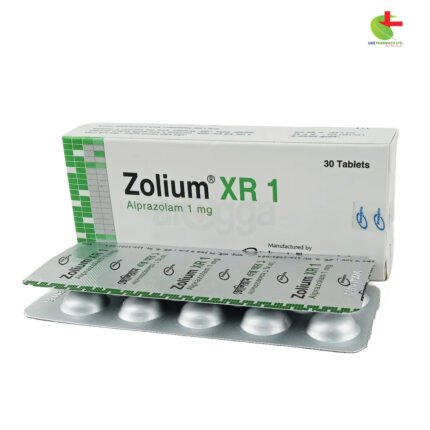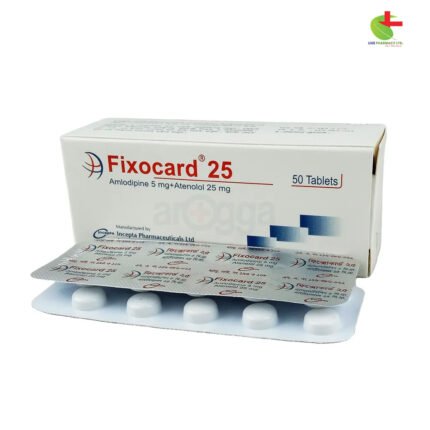Amlotab 5
50.00৳ Strip
- Amlotab is a calcium-channel blocker effective for treating essential hypertension and different forms of angina, including chronic stable and vasospastic angina.
- It promotes vasodilation, lowering blood pressure and enhancing coronary blood flow.
- Suitable for adults and children aged 6 and older.
- Can be taken without regard to meals.
- Always consult a healthcare professional for personalized dosing and recommendations.
 Brand
Brand
|
Incepta Pharmaceuticals Ltd |
|---|---|
 Generics
Generics
|
Amlodipine Besilate |
 Type
Type
|
Tablet |
Indications
Amlotab is prescribed for:
- Essential Hypertension: Effective as a standalone treatment and can be combined with other antihypertensive medications.
- Angina Pectoris: Indicated for chronic stable angina, usable alone or with other antianginal agents.
- Vasospastic Angina: Suitable for confirmed or suspected cases, either as monotherapy or alongside other antianginal drugs.
Always consult a registered healthcare professional before using this medication.
Pharmacology
Amlodipine, the active component of Amlotab, is a dihydropyridine calcium-channel blocker known for its extended action. It targets myocardial cells, the heart’s specialized conduction system, and vascular smooth muscle cells. Amlodipine primarily promotes vasodilation, leading to decreased peripheral resistance, lowered blood pressure, and improved coronary blood flow, which enhances myocardial oxygen delivery and cardiac output.
Dosage & Administration
- Hypertension: Start with 5 mg once daily; maximum dosage is 10 mg once daily. Elderly patients or those with liver issues may begin with 2.5 mg daily.
- Angina (Chronic Stable or Vasospastic): Typical dosages range from 5 to 10 mg, with lower doses recommended for the elderly and those with hepatic impairment.
Note: Amlotab can be taken without regard to meals.
Always consult a registered healthcare professional before using this medication.
Interactions
- Hazardous Interactions: Use caution with patients who have significantly impaired left ventricular function; avoid combining Amlotab with beta-blockers in these cases.
- Other Interactions: Studies indicate no significant interactions between Amlotab and Digoxin, Cimetidine, or Warfarin. Food does not affect the absorption of Amlotab.
Contraindications
- Hypersensitivity to dihydropyridine derivatives
- Pregnancy
Side Effects
Common side effects associated with Amlodipine’s vasodilatory effects include dizziness, flushing, headache, hypotension, and peripheral edema. Other possible effects may include gastrointestinal disturbances, increased urination, lethargy, eye pain, and depression. Some patients may experience a paradoxical increase in ischemic chest pain at treatment onset or excessive drops in blood pressure.
Pregnancy & Lactation
Pregnancy Category C: Limited studies in pregnant women indicate that Amlodipine should only be used if the potential benefits outweigh risks. Its excretion in human milk is unknown; thus, breastfeeding is not recommended while on Amlodipine.
Precautions & Warnings
Use caution in patients with liver impairment and during pregnancy and breastfeeding.
Use in Special Populations
- Children (6 to 17 years): Starting dose is 2.5 mg daily, increased to 5 mg if blood pressure goals aren’t met after 4 weeks. Higher doses have not been studied.
- Children under 6 years: Safety and efficacy are not established.
- Elderly: Amlotab is generally well-tolerated; normal dosages are recommended with careful titration.
- Renal Impairment: Normal dosages are suggested as plasma concentration changes are not correlated with renal function.
- Hepatic Impairment: Start at the lower dosage (2.5 mg) and adjust slowly in patients with severe liver impairment.
Overdose Effects
Symptoms may include excessive vasodilation and reflex tachycardia, leading to significant hypotension or shock. Management includes active cardiovascular support, monitoring vital signs, elevating extremities, and possibly administering intravenous calcium gluconate to counteract calcium channel blockade. Gastric lavage may be beneficial in some cases.
Therapeutic Class
Calcium-channel blockers
Storage Conditions
Store in a cool, dry place away from light. Keep all medications out of reach of children.













Reviews
There are no reviews yet.